Intuitive eating has grown in popularity recently, so you may have even heard of it by now. Created in 1995 by two registered dietitians, Evelyn Tribole and Elyse Resch, intuitive eating is an evidence-based, weight-inclusive approach to nutrition.
Intuitive eating focuses on listening to your body’s unique needs and your intuition when nourishing yourself. No foods are off limits unless there are medical reasons you cannot eat certain foods, such as allergies.
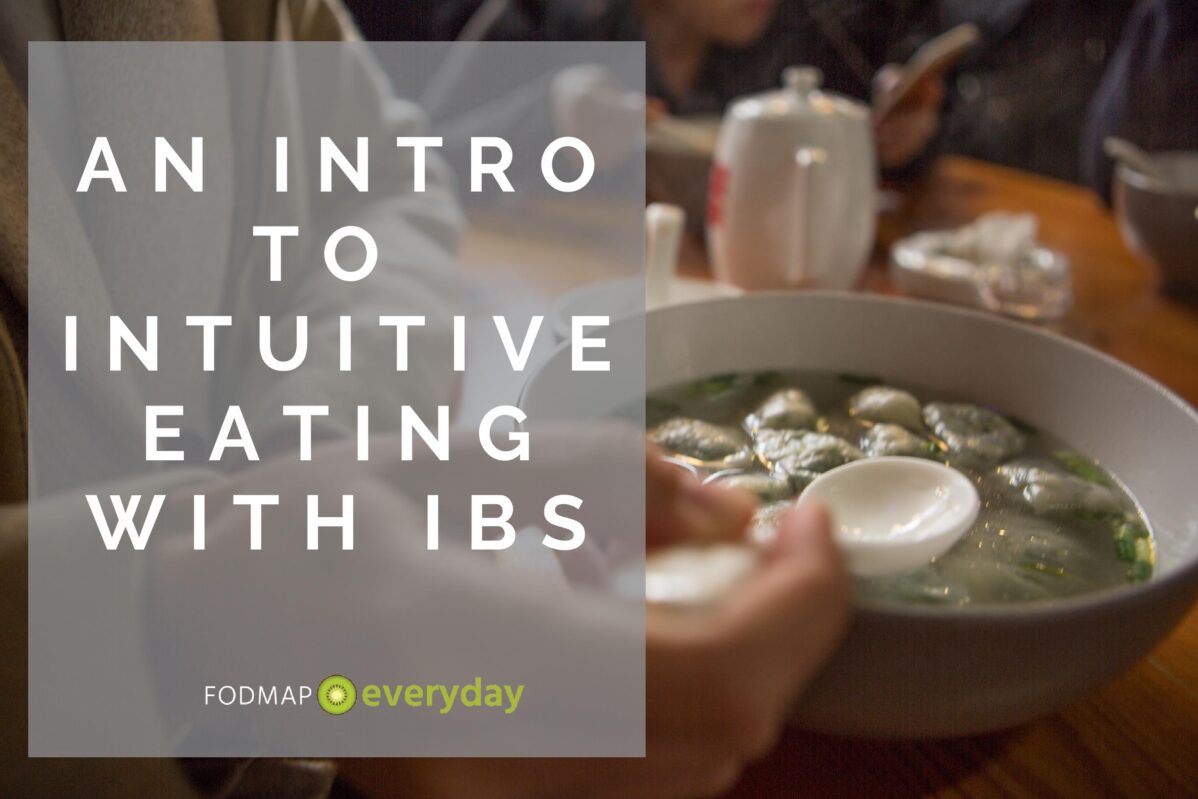
Table of Contents
The Ten Principles of Intuitive Eating
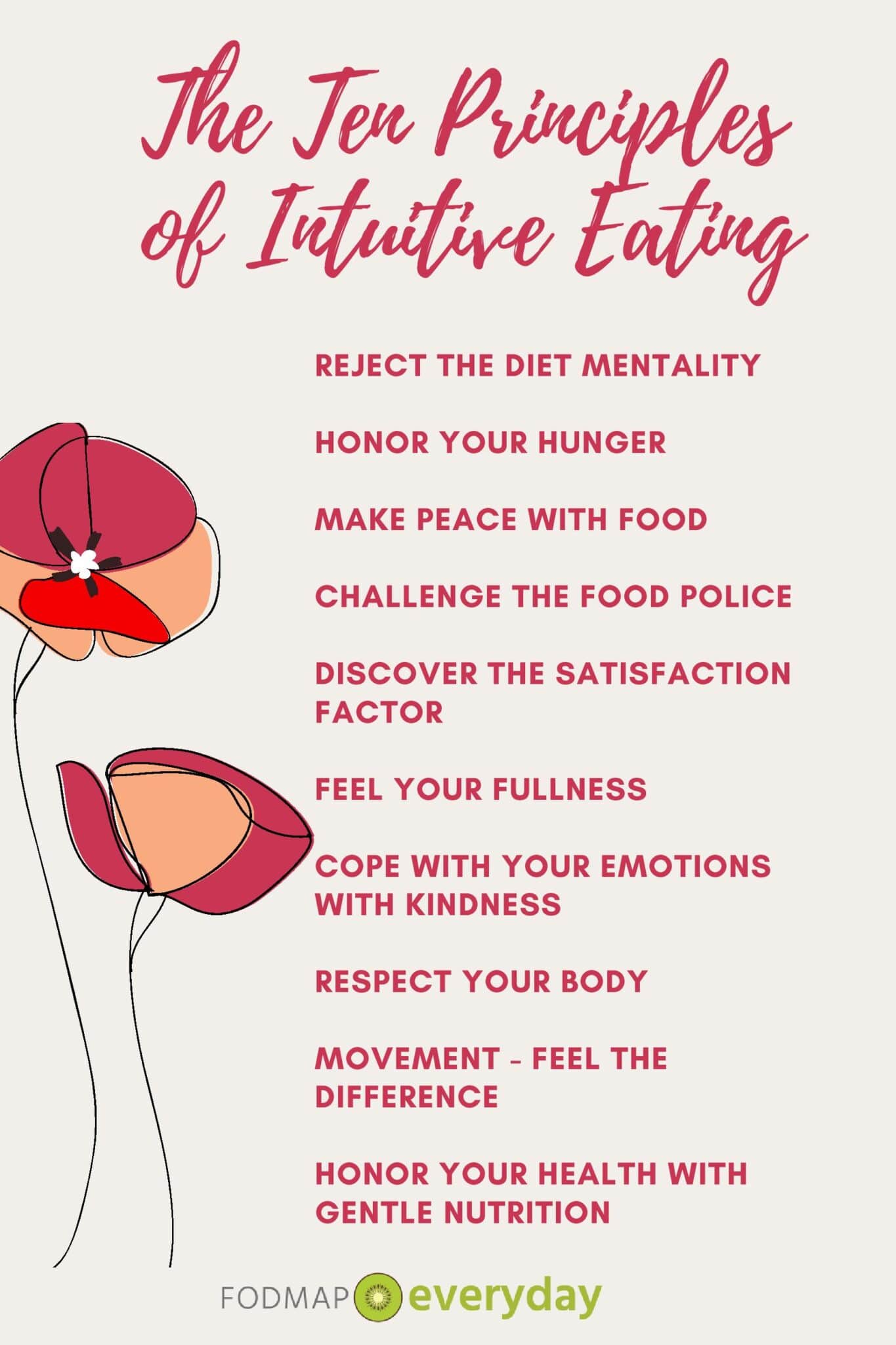
Intuitive eating is made up of ten principles, which are:
- Reject the Diet Mentality
- Honor Your Hunger
- Make Peace With Food
- Challenge the Food Police
- Discover the Satisfaction Factor
- Feel Your Fullness
- Cope With Your Emotions With Kindness
- Respect Your Body
- Movement – Feel the Difference
- Honor Your Health With Gentle Nutrition
Each principle helps you develop a healthier relationship to food and your body, resulting in improved physical and mental health.
Central to intuitive eating is taking the focus away from weight and instead turning it towards developing this positive relationship to food, movement, and your body. Contrary to the weight-centric lens medical care has taken (the roots of which are very flawed), this approach is weight neutral, promoting health without a focus on weight.
Benefits of Intuitive Eating
As mentioned above, intuitive eating is a research-based approach. Some of the many proven benefits of intuitive eating are:
- Improved cholesterol levels
- Lower rates of emotional and disordered eating
- Improved blood pressure
- Decreased depression and anxiety
- Increased self esteem
- Improved body image
- Increased satisfaction with life
What Intuitive Eating Is Not
It has often been misconstrued as the hunger and fullness diet, wrongly practiced as only eating when you’re hungry and stopping when you’re full. This is an overly simplified version of what intuitive eating truly is. While tuning into these cues are a part of the process, other forms of hunger are honored and self-compassion takes precedence.
How To Eat Intuitively With Chronic Conditions – Like IBS
A common concern for people with chronic conditions is how intuitive eating can be practiced in their lives when they also have a medical condition to manage. The last principle of honoring your health with gentle nutrition allows space for dietary interventions for medical conditions while practicing intuitive eating.
Now that you have an idea of what intuitive eating is, let’s talk about how you can incorporate this as someone with IBS beginning your low FODMAP process. We’ll delve into how intuitive eating can be incorporated in each phase, including an affirmation to hold with you as you progress.
Elimination Phase
First of all, remember that this phase is temporary. Working with a registered dietitian is strongly recommended as they will help guide you through this phase. You may experience symptom relief quickly.
Be aware that disordered eating can be present in individuals with conditions such as IBS, since they often have a complicated relationship with food. Eliminating foods and feeling symptom relief in this phase may tempt you to maintain this restriction. The eliminated foods may understandably bring up a lot of fear. By no means do I want to undermine the discomfort and pain associated with IBS symptoms. However, what we do know is that restrictive diets are not sustainable, at least not without the development of disordered eating behaviors.
It Is a Journey
Although certain foods will be restricted during this phase, be sure to still honor your hunger by feeding your body with low FODMAP foods. Doing your best to view this as a journey that will likely involve struggles and successes can set you up to develop that healthier relationship to food instead of continuously fearing it.
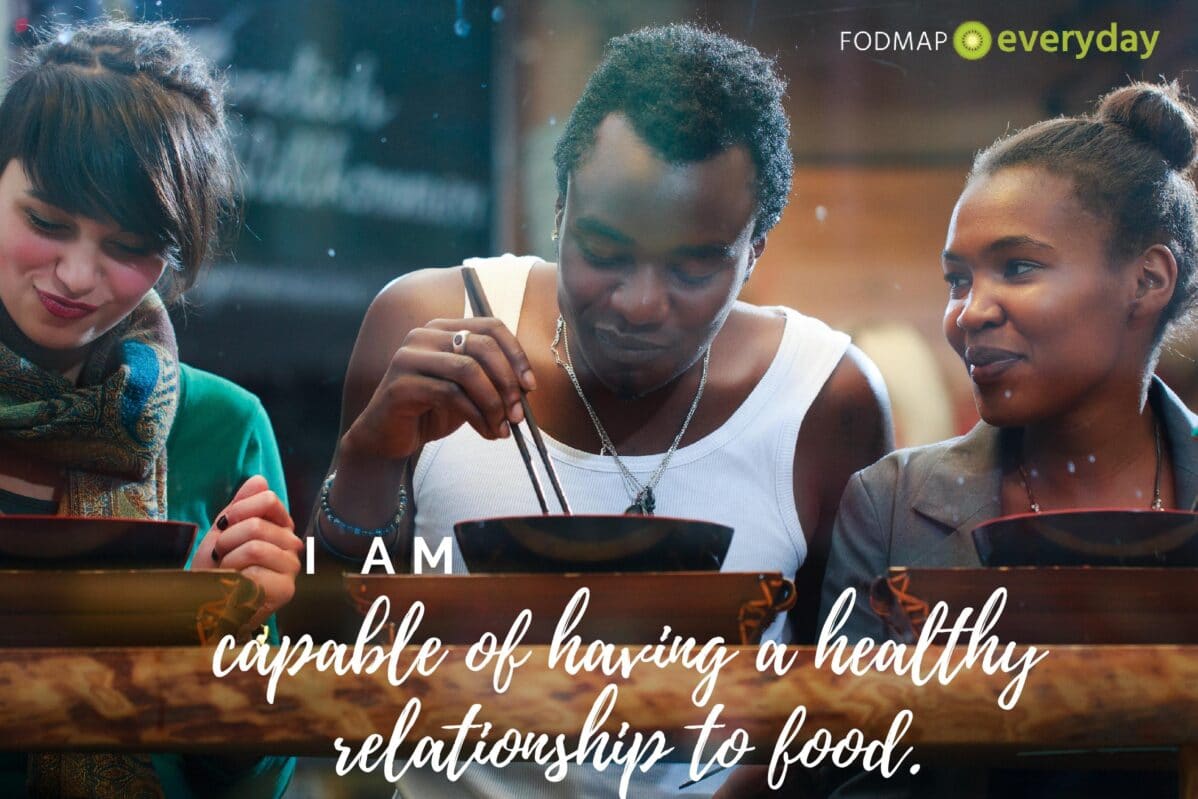
One principle that I invite you to fully embrace in this phase is “Movement – Feel the Difference”. Too often, movement is only acceptable by our society if it is an intense exercise routine. It becomes more of a punishment for our bodies than an opportunity to connect with them and care for them. This principle entails rediscovering the joy in movement. It does not have to be an intense gym workout to be valuable. Reflect on what forms of movement you loved as a child. Try out classes you may not have tried before that seem fun to you. There are plenty of other forms of unstructured movement that should not be discounted either, such as walks with family, household chores, or a labor-intensive job.
You May Want To Read: IBS & Yoga Series Intro: It’s Your Body – this series offers gentle body movement guidance and ways to integrate healthy movement into your everyday life.
Challenge Phase
In the Challenge Phase, you are testing out adding foods back into your diet to see how your system reacts. This requires being in touch with your body, paying attention to what foods irritate it and what foods sit well. Eating mindfully will be key to be able to recognize trigger foods.
You May Want To Read: The Low FODMAP Diet is Not Just About the Elimination Phase
You Are Unique
In this process, practice the principle of “Respect Your Body” by acknowledging that your body is unique. It can very well feel frustrating if certain foods irritate your system. It can lead you to feel like your body is against you. Intuitive eating invites you to be on the same team as your body instead of against it. How can you best take care of your body?
Central to intuitive eating is the idea that food is morally neutral. You are not a better or worse person for how you eat. Therefore, even if you do eat foods that irritate you, reflect on how you can best take care of your body next time instead of directing frustration towards your body.

You are not morally superior for eating only foods that sit perfectly with your body. That being said, foods that irritate your body probably won’t help promote your overall well-being. By learning more about how your body reacts to certain foods and nourishing it the way that makes it feel best, your body can trust you to honor it and you can learn to trust its ability to take care of you and protect you.
Integration Phase
This phase forms your lifelong eating habits. The final stage must be sustainable, and supportive of both your mental and physical well-being. As you settle into recognizing what foods constantly irritate your system and those that sit well, you are in the best position to truly embrace intuitive eating. All principles of intuitive eating can be incorporated into your life.
Something to note in this stage is to be conscious of the terminology you’re using to describe different foods. While the term “safe” may be used to describe foods that typically do not result in IBS systems, that terminology can become internalized and trigger disordered eating behaviors, and for this reason we here at FODMAP Everyday® have ceased using these terms and invite you to do the same.

For example, when foods are labeled as “good” and “bad” in the weight-centric lens, it often leads to people feeling morally inferior for eating “bad” foods and morally superior for eating “good” foods. The terminology has not remained confined to just the food, but it has become a reflection of your worth as a person. Food is truly “unsafe” if it is contaminated or rotten, and using terms like “safe” can cause you to fear certain foods and strictly stick with the “safe” ones. That can worsen, causing you to unnecessarily over-restrict your intake.
Stress & IBS
Stress is often a co-factor with IBS. IBS can create stress, and stress can trigger IBS symptoms. If this is true for you, please check out our article on IBS & Stress.
The Takeaway
The process of intuitive eating while going through the low FODMAP process invites you to connect with your body. Recognize how your body responds to different foods and be mindful of any resulting symptoms of lack thereof.
Learning about the principles of intuitive eating can help you honor your unique body and take care of it. You can discover your food preferences while acknowledging those foods that don’t typically sit well with you. You and your body can learn to trust each other again and repair a relationship that may have been compromised as a result of living with IBS.
Resources:
Official Intuitive Eating website: https://www.intuitiveeating.org
Intuitive Eating studies: https://www.intuitiveeating.org/resources/studies/
Health At Every Size community resources: https://haescommunity.com
Henry Blackburn, David Jacobs, Jr, Commentary: Origins and evolution of body mass index (BMI): continuing saga, International Journal of Epidemiology, Volume 43, Issue 3, June 2014, Pages 665–669, https://doi.org/10.1093/ije/dyu061
Hunger, J.M., Smith, J.P. and Tomiyama, A.J. (2020), An Evidence‐Based Rationale for Adopting Weight‐Inclusive Health Policy. Social Issues and Policy Review, 14: 73-107. doi:10.1111/sipr.12062
Tracy L. Tylka, Rachel A. Annunziato, Deb Burgard, Sigrún Daníelsdóttir, Ellen Shuman, Chad Davis, Rachel M. Calogero, “The Weight-Inclusive versus Weight-Normative Approach to Health: Evaluating the Evidence for Prioritizing Well-Being over Weight Loss”, Journal of Obesity, vol. 2014, Article ID 983495, 18 pages, 2014.https://doi.org/10.1155/2014/983495
Be sure to follow Isabel on Instagram! And visit her website Your Latina Nutritionist .
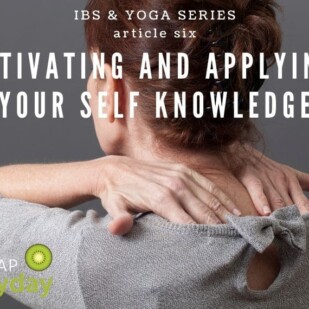
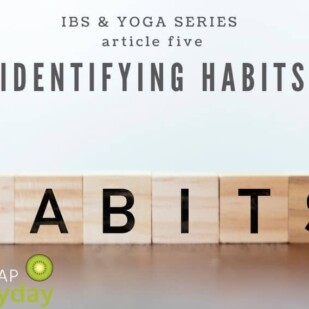






I can’t thank you enough for this article. I have IBS myself and I’m also a Certified Intuitive Eating Counselor. I’ve seen how diet and wellness culture has destroyed people’s relationships with food, but especially among those with IBS. My IBS is more under control than ever as an intuitive eater. Thank you for spreading such valuable information to the IBS community!
Renee, Thank you for taking the time to write. It means so much to us to know that the content is meaningful and really helping people. Help us spread the word with this article…we couldn’t agree more that this is a topic that should be more well known and actively discussed.